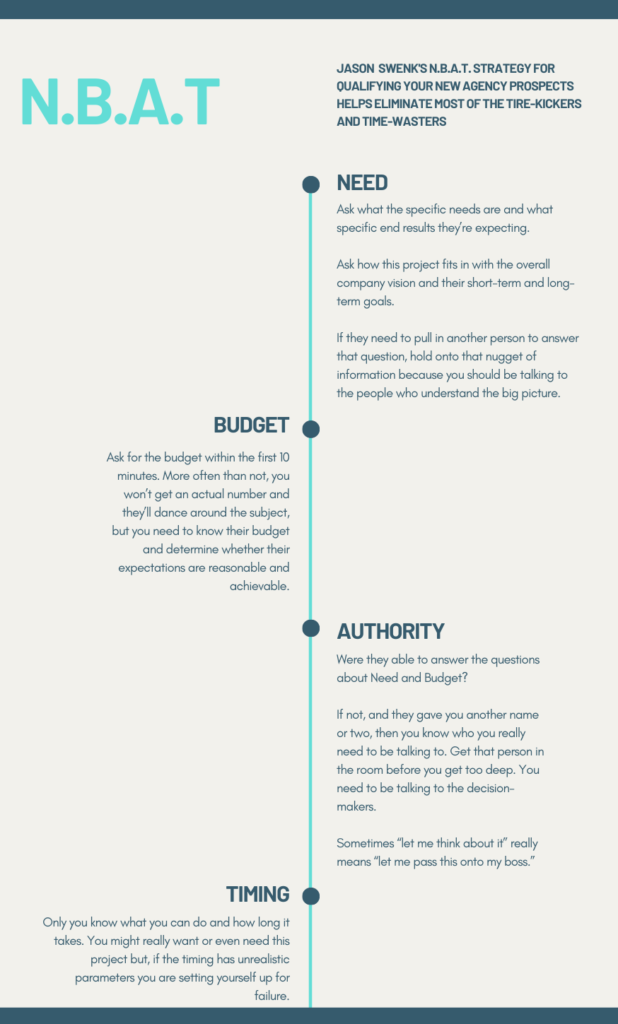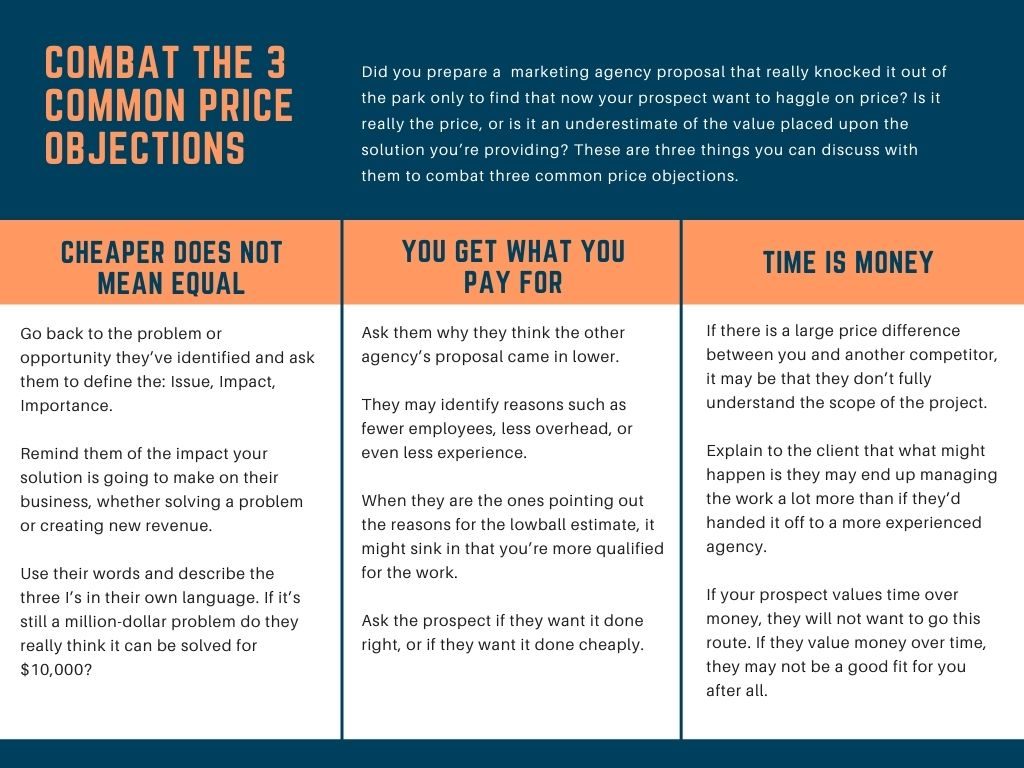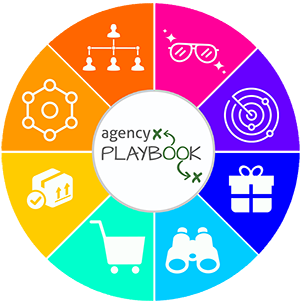How to Handle the Top 5 Agency Sales Objections
Have you ever felt like your marketing agency proposal really knocked it out of the park, only to have the prospect put you off? It has happened to all of us, probably more times than we’d care to admit.
You put a ton of time, energy, and effort into a stellar proposal, and then you’re hit with a lackluster response. Something like, “let me talk to my partner” or “let me see if we have the money” or my personal favorite, “send me more information.”
Are these responses just put-offs or simply objections that can be flipped into a more favorable responses?
Top 5 Agency Sales Objections
The best marketing agency proposal answers questions before they’re asked. Be transparent by sharing your exact process and builds more trust.
Of course, questions and objections will still be raised, but if your proposal answers 90% of the unasked questions, you’re so close!
That’s when the agency salesperson comes through on the extra 10% and brings it to the finish line.
I firmly believe there are no bad agency clients; only bad prospects or a bad process.
So, how do you know if your prospect has a true objection or is just wasting your time? There are some tactics you can apply to get to the bottom of things faster and easier. And you will turn more no’s and maybe’s into yes’s.
Here are 5 common reasons prospects say “no” to your marketing agency proposals and what you can do to change the outcome.
So, let’s start with my personal favorite…
1. “Send me more information.”
When your prospect gives you this line, it means one of two things, either:
Something is missing… or, you’re just getting nicely blown off.
It can be difficult to know which case you’re dealing with.
This is why I tell my clients to always ask: WHAT, WHEN, and WHY.
These three simple questions will help you determine whether you need to help your prospect overcome a hang-up or whether they’re putting you off:
Ask: “WHAT information would you like me to send you?”
This helps you determine what might be missing from your proposal and what else they need to know before they can say yes. Sometimes we’re just too close to the business and don’t realize we aren’t sharing as much as needed in order to make an easy decision for the prospect.
Ask: “WHEN would you like me to send the information?”
Maybe they are trying to meet a specific deadline or achieve a time-sensitive goal. You want to follow up with the right information at the right time in order to increase your chances of working together.
Ask: “WHY do you need this additional information?”
This will help you understand more of the specific goals the prospect is trying to achieve. It might also reveal whether you’re speaking to the right decision-maker or not. Perhaps the person you’re working with will say they need more information to pass along to their boss or business partner. You need to get in front of the right person or people to answer questions accurately.
If someone is just blowing you off, they won’t have good answers to these questions.
On the other hand, a good prospect who is genuinely interested in working with your agency will have a very specific piece of information they’re requesting, as well as a timeline and reason.
Next, assuming this is still a legitimate prospect, you’ll obviously agree to send the information, but make sure to set up the next meeting right then and there.
Get commitment upfront. That’s how you’re going to close more business and stop wasting time on the wrong prospects.
2. “Let me think about it.”
Another equally frustrating sales objection is when you spend a ton of time winning a new client only to hear them say, “let me think about it.”
Is it a real sales objection or just a put-off? Do they actually need more time to think about it?
Unfortunately, this is a pretty typical response.
You and your team work so hard to get the meeting, gather the information, create the proposal, and walk them through the plan just to hear something lame like, “let me think about it.”
It’s beyond frustrating! I know firsthand because it was a common put-off for me and my agency’s sales team.
Luckily, there is an easy solution that can be met with a few upfront questions.
Now, if it’s a put off then your prospect just doesn’t want to say “no.” They think they’re being nice, but really have no intention of working with you. However, if it’s a legitimate objection (and, a lot of times it is) then you can actually prevent issues by gathering more information upfront.
When you hear “let me think about it” it’s usually due to one of three reasons:
- The prospect remains unclear about the plan. You may be using phrases or jargon that makes it unclear what you’re going to do for the client. You may be using agency-industry language when you should be using client-industry language. Are you being clear and concise in how you present the plan?
- The prospect is unclear about the results. Remember, you are not selling your agency’s services to your prospects, you’re selling them on results. Do they understand how your solution will ease their pain point or resolve their issue? Have you established trust and authority in order to build their confidence in your ability to deliver successful results?
- Your agency is unclear on one or more of the N.B.A.T. criteria. That is: Need, Budget, Authority, and Timing. NBAT is the best way to qualify your prospects, so you don’t waste time with the wrong ones and only spend time on the ones that are ideal for your agency.

So, as you prepare for your next new business pitch, instead of dreading the “let me think about it” line, approach the pitch proactively. Make sure you’re clearly defining the plan and the results. Make sure you have a full understanding of NBAT. When you have all these bases covered, you’ll drastically reduce or even eliminate this objection.
3. “We had a bad agency experience.”
Now, of course, you want to win more new agency business, but it can be hard when your prospects have already had a negative experience with the competition, which is another objection you may find.
First impressions can be everlasting – good or bad – and, unfortunately, sometimes we can be held accountable for a negative impression left by an awful experience with another agency.
These experiences can be a common objection as prospects don’t fully understand what separates your agency apart from others.
Whether it’s poor communication in terms of expectations and deliverables, poor strategy, or just a clash in personalities – bad experiences happen and the best thing you can do is to educate your prospects that that isn’t the norm.
How Can Your Agency Turnaround a Prior Bad Experience?
Educate them on the plan.
Walk your prospects through the plan you have for them. Explain exactly how you’re going to help achieve their goals or ease their pain points.
Talk to them about what success looks like after working with you.
There’s inherent uneasiness when people don’t know what to expect, but when there’s a clear plan in place, your prospect can feel more confident and assured.
Inform them about your systems and processes.
Clearly communicate what you do and how you do it in terms and phrases your prospects can understand. Make sure they fully understand your systems and processes for completing work.
As marketers, we can get excited about our ideas and work, but we can overwhelm prospects by using too much industry jargon. Keep it simple, but do explain how you’re different and even call out how “other guys do it” and what makes your agency different (and better).
Know and understand their 3 I’s: Issue, Importance and Impact.
- What issue are they having?
- What is the impact this issue is having on their business?
- Finally, what is the level of importance, or what is the consequence if they don’t address the issue?
When the right prospects are fully educated they will choose to work with you, but it requires work to build relationships and trust. Bottom line, that issue is important and impacting their business. They need it resolved and if you’ve done your job of educating it can be yours.
The next time a potential new client tries to blow you off based on judgments from a bad experience with another agency, you know what to say.
4. “Do you have any references?”
What if the prospect isn’t asking you for more information or for time to “think about it” but instead asks you for references? If that has ever happened to you, what have you done in that instance? Does it hurt or help you to use past clients as references for new ones?
The request for references is simply the presence of doubt in the prospect’s mind. If someone is asking for references it means there’s still something they’re uncertain about when it comes to working with you… And bottom line, that means there’s a hole in your sales process.
Yes, some people just like to double-check that they’re making the right choice with references, but if they’re doing this, it’s also possible that somewhere in your sales process, you failed to earn their trust fully or to prove your value.
Frankly, giving references hurts your agency business. Here’s why:
- You respect your clients’ time. When a prospect calls your clients it takes up their valuable time. They are spending time helping “sell you” when they should be using their time working on their business. Letting your prospects call your clients is a lack of respect for their time.
- Your strategies are proprietary. A lot of prospects will move from asking questions about results, to ask questions specific to your agency’s strategy and processes. These topics are intellectual property, and (not knowing any better) your amazing clients might start giving away your secret sauce for free. Yikes!
So, this is what you can do instead of giving references:
When a prospect asks for references, counteract by asking more questions. What is missing for them? What are they unsure about? You want to see what else you can clear up for them, instead of letting a reference or testimonial talk them into (or even out of) working with you.
First, find out what’s missing and why they want to speak to a reference. Answer all the concerns and objections you can.
Next, tell them exactly why references may not be what they need.
Finally, tell your prospects you want to share a case story or two instead of a reference. These can often accomplish the same trust-building that references can without monopolizing a client’s time or putting your IP at risk.
If, after more discussion, they still want references, only do this as a last resort. Make sure to have a client or two you trust and have previously discussed being contacted.
5. “Another agency will do it cheaper.”
After answering all questions and offering every bit of information you can to ease the prospect’s mind about working with you, you may find they want to haggle on agency prices.
They say something like “This proposal is pretty steep…” or “I got a cheaper quote from someone else…” This may just be a case of an uninformed prospect who just needs more education. Or this might be the sign of a bad prospect who is not the right fit for your agency.
If price is a real issue they might not be a good match for you. However, sometimes price is just a cover for deeper issues.
Ask yourself, “is it really the price, or is it an underestimate of the value placed upon the solution you’re providing?” Oftentimes, your prospects aren’t fully educated on value, and, in turn, undervalue what you’re delivering.
Instead of getting bent out of shape right away, there are three things you can discuss with them.
How to Combat 3 Common Price Objections:
- Cheaper does not mean equal. Go back to the 3 I’s (Issue, Impact, Importance). Is the lower cost option really meeting the objectives of the 3 I’s?
- You get what you pay for. Ask the prospect why the other agency’s proposal is cheaper and let them think through the cost vs. quality differences.
- Time is money. Often, the cheaper option just makes more work for the client. Remind them saving money may end up costing them more time.

Thinking Through Your Price Tag
Bottom line: You need to help prospects logically think through supposedly more affordable proposals.
Sometimes prospects only see dollar signs and forget how to really scrutinize what they’re getting. When you initiate conversations like these, it helps them second guess their gut reaction of going with the cheapest option.
There is no such thing as a bad agency client. There are only bad prospects and bad processes.
If you have a bad agency client, it’s only because you let them in… but when you tighten up your process and weed out the bad prospects, you’ll only be working with the right clients that value your services and pay what you’re worth.
Do You Want to Build a Better Agency?
In this episode, I explained the importance of agency core values and how they can help you setup a successful team in your agency but what else do you want to know? Through my experience in the industry, I have advice on many topics from the struggles you may face with failing economies and recessions to how accepting a speaking opportunity can create business and using social media and Youtube can boost marketing for your agency.
Learn more about me and check out all my tips, tricks and everything you need to know in my blogs. I cover a wide variety of topics as well as answer your questions in my Ask Swenk series.
Are videos are more your thing? That’s OK!
You can check out my Ask Swenk series and more of my videos on my Youtube channel for advice from myself and other agency experts.


